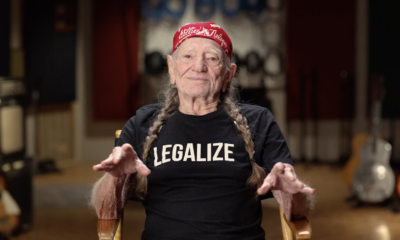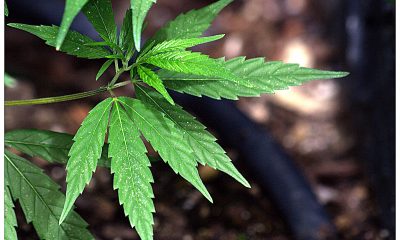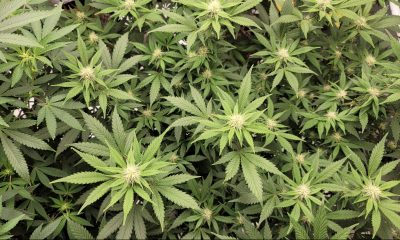Politics
This Man Is The Reason Congress Can’t Vote On Marijuana Anymore

The full U.S. House of Representatives hasn’t voted on any marijuana amendments since 2016, and it’s largely because of one man.
In his capacity as chairman of the House Rules Committee, Congressman Pete Sessions (R-TX) has enormous power over which measures make it to the floor for consideration by his colleagues.
Despite continued efforts from a large group of bipartisan representatives, Sessions’s panel has consistently blocked all cannabis proposals from advancing over the course of nearly two years.
In wide-ranging comments at a federal event on Tuesday, Sessions revealed the extent to which he disapproves of marijuana use and misunderstands scientific research about its effects.
“If addiction is the problem and we have marketers of addiction that include marijuana — because all you have to do is go to any of the stores in Colorado and they can give you high to low to medium to chocolate — we ought to call for it what it is,” he said, according to the Fort Worth Star-Telegram. “If it were nicotine, it would have been outlawed; well, it would have been handled differently. But this is a political issue.”
Saying he thinks there are “better alternatives [than marijuana to treat medical conditions],” Sessions’s view is that “we don’t have to go to that.”
And implying that marijuana use causes young people to do other drugs as well, he asked, “Where do they start? If it’s marijuana, we ought to stand up and be brave in the medical community to say this political direction is not right.”
Numerous studies have shown that cannabis has medical value for people suffering from a variety of conditions, and research has routinely debunked the so-called “gateway theory” about marijuana leading to use of other drugs.
Also at the event, hosted by the U.S. Department of Health and Human Services, Sessions claimed that the potency of marijuana has risen dramatically since he was a young man.
“I referred to marijuana as merchants, this is a merchants of addiction, they are making it more powerful and more powerful and more powerful,” he said, according to the Star-Telegram. “When I went to high school … in 1973, I graduated, marijuana, on average, is 300 times more powerful. That becomes an addictive element for a child to then go to the next thing.”
While studies have shown that the THC concentrations in cannabis have generally risen over the past several decades, the “300 times more powerful” figure isn’t supported by the research base. Taken at face value, the math would mean that cannabis plants are comprised of more than 100 percent THC, a physical impossibility.
Sessions Blocks All Marijuana Amendments
After years of trying and failing to pass cannabis amendments in Congress, reformers scored their first big federal legislative victory in 2014, when the House of Representatives passed a measure to block the Justice Department from interfering with state medical cannabis laws. The measure was enacted into law, and also approved the following year with an even bigger bipartisan margin of victory on the House floor.
In the two years that followed, representatives also approved measures to increase marijuana businesses’ access to banks and protect state industrial hemp research programs from federal intervention.
The last time the full House voted on marijuana, in May 2016, it approved a measure to allow military veterans to receive medical cannabis recommendations from U.S. Department of Veterans Affairs doctors.
But the next month, Sessions’s Rules Committee began its cannabis blockade by preventing measures on marijuana banking and letting Washington, D.C. spend its own money to regulate cannabis from advancing.
Since then, the panel has consistently blocked any and all marijuana amendments from moving to the floor, including ones to extend the existing medical cannabis protections and to allow marijuana providers to take tax deductions that are available to businesses in other industries.
The committee has also shut down measures to extend the existing state medical cannabis protections to cover laws that allow for recreational marijuana use. In 2015, that amendment came just nine flipped votes short of passage on the floor. The number of states with legalization has more than doubled since the last vote on it, so the proposal would almost certainly pick up support now that many more members of Congress represent businesses and consumers who would be protected by it.
But Sessions’s blockade has ensured that his colleagues haven’t been given another opportunity to consider it again.
While the decision to stop letting the House vote on marijuana measures came at the same time as leaders began shutting down amendments on other issues deemed to be controversial, such as gun control and LGBT rights, Sessions’s new comments at the HHS event show he has a particular concern about cannabis policy changes.
Personal Experience Informs Sessions’s Anti-Marijuana Views
Last month, just before blocking a new version of the amendment to protect broad state marijuana laws from advancing, the Texas Republican spoke about his distaste for marijuana.
“I, as probably everybody in this rooms knows, have a strong opinion on drugs, illegal drugs, alcohol,” he said. “Marijuana is an addictive product, and the merchants of addiction make it that way. They make it for addiction. They make it to where our people, our young people, become addicted to marijuana and keep going.”
And his position seems to be informed by the experiences of people who are close to him.
At the HHS event this week, Sessions spoke about cases of two individuals:
“A dear friend of mine, David Siegel, a wealthy man, one of the wealthiest men in America, had an 18-year-old daughter who was in treatment, I believe for marijuana and maybe cocaine,” Sessions said. “She met a boy there and within three weeks after being out she was dead. She came back and did what she had been doing after being off it.”
…
Sessions later told of a Boy Scout he knew in Lake Highland, who went off to school at Texas A&M, and fell into heavy drug use started by smoking marijuana. “Never had smoked marijuana,” Sessions said. “At the end of the first year, he was well into it; the second year, he was into heroin. The drive for addiction with some of our children is insatiable. You just never know when you’re looking at a kid what drives them. But parents are desperate.”
Sessions, like all members of the House, is up for reelection this year. The Cook Political Report, which tracks congressional races, currently rates the district as “Lean Republican.”
In the meantime, Sessions faces fellow Republican Paul Brown in a March 6 primary. Brown’s campaign website says the federal government “should not legislate…narcotics. Those should be legislated by states or localities if they are to be legislated at all.”
Congressman Earl Blumenauer (D-OR), one of the House’s leading advocates for marijuana policy reform, announced last year that his political action committee would pay to put up billboards in Sessions’s district criticizing his cannabis blockade.
Pro-Legalization Congressman To Target Anti-Cannabis Lawmakers
The Texas congressman has no relation to U.S. Attorney General Jeff Sessions, also an ardent legalization opponent.
















